Life Sciences News
See our Latest Journal Publications
Ash dieback experts identify shoots of hope for Britain’s threatened trees
Epidemiologist Dr Matt Combes was recently interviewed for the Guardian about Ash die-back in the UK and the scientific efforts to protect ash trees. The publication highlights Matt's review article on ash die-back and his more recent work at Warwick modelling the severity of the disease and how this may interact with the emerald ash borer beetle. The modelling is part of the SMARTIES (Surveillance and Management of multiple Risks to Treescapes: Integrating Epidemiology and Stakeholder behaviour) project.
Read the Guardian article (20 December 2024).
Photograph: Andy Soloman/Alamy
Scientists make breakthrough in studying deadly ventilator pneumonia
Dr Dean Walsh, Dr Freya Harrison, Dr Saskia Bakker and colleagues have made a breakthrough which could help find new treatments for a deadly infection that can affect up to 40% of hospital patients using mechanical ventilators.
Press Release (15 August 2024).
Life Sciences Research with Impact
The recently published BBSRC Impact Showcase 2023 presents a collection of impact stories arising from BBSRC investments. The showcase highlights the vital role bioscience has in addressing key strategic global challenges and features research by Professor Eric Holub to develop new varieties of beans compatible with the British Climate.
Find out more (Scroll down the homepage to find 'Homegrown production of designer dry beans').
Researchers to benefit from £18 million investment in world-class frontier bioscience
Researchers at The University of Warwick are among four world-class teams receiving a share of £18 million to pursue transformational bioscience research programmes. The School of Life Sciences team will investigate the bacterial cell wall – which could help to develop new classes of antibiotics, tackling the global challenge of antibiotic resistance. The project is led by Professor David Roper in collaboration with Dr Séamus Holden, Professor Phill Stansfeld and Dr Stephen Cochrane (Queen's University Belfast).
Press Release (29 September 2023)
The University of Warwick celebrates the successful harvest of "GODIVA" and ‘OLIVIA’ – two novel dry beans inspired by local cultural history.
Researchers at Warwick Crop Centre have celebrated the successful harvest of a homegrown bean developed to thrive in a British summer.
Press Release (9 September 2023)
Professor Eric Holub and research fellow Rosanne Maguire discuss the novel bean varieties on BBC CWR.
Robocrop: The robot assistants helping farmers to increase productivity
The future of farming could involve robots– as farmers seek to address labour shortages and increase crop yields.
Warwick Crop Centre and WMG are working in close collaboration to combine their robotics expertise and plant science expertise to investigate how they can apply autonomous robotics to greenhouses and croppable fields.
Press Release (25 August 2023)
Scientists reveal why sprouts taste better as you get older… and why your grandparents were right all along
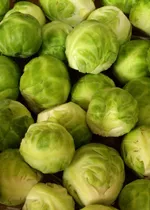 Researchers from Warwick Crop Centre are sharing food for thought about the humble sprout this Christmas and tell us:
Researchers from Warwick Crop Centre are sharing food for thought about the humble sprout this Christmas and tell us:
• Why having a gene mutation makes sprouts taste horrid
• Why sprouts taste better after frost
• Why they make us gassy
Press release (15 December 2022)
£1.5m Crop Research Centre opens at University of Warwick
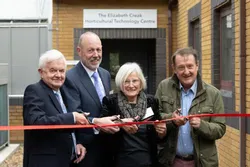 A facility using gene-editing technology to improve quality, resilience and sustainability of vegetable crops has opened at the University of Warwick.
A facility using gene-editing technology to improve quality, resilience and sustainability of vegetable crops has opened at the University of Warwick.
The Elizabeth Creak Horticultural Technology Centre (ECHTC), which also contains The Jim Brewster Laboratory, is a £1.5 million facility which will use cutting edge techniques such as gene-editing to improve vegetable crops.
Addressing issues relating to disease resistance, crop yield, adaptability to climate change and nutritional value in horticultural plants, the research will help with the key global challenges of climate change and feeding the world’s growing population.
Press Release (10 November 2022)
£1.7m memorial donation enables new antimicrobial research
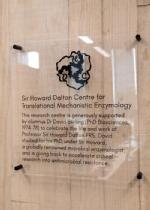 A £1.7 million memorial donation will help drive new research into antimicrobial resistance at the University of Warwick. The donation, made in recognition of the late Sir Howard Dalton, will fund research and scholarships to help discover new drugs that target resistant microbes.
A £1.7 million memorial donation will help drive new research into antimicrobial resistance at the University of Warwick. The donation, made in recognition of the late Sir Howard Dalton, will fund research and scholarships to help discover new drugs that target resistant microbes.
On Thursday 20 October, a launch event was held in the University of Warwick’s new Interdisciplinary Biomedical Research Building (IBRB) for the Sir Howard Dalton Centre for Translational Mechanistic Enzymology. Professor Chris Dowson, Co-Director of the new Centre said “A key focus for scientists at the Centre will be understanding changes to enzyme structures which underpin drug resistance in microbes. We want to discover how these modified enzymes are formed and what we can do to overcome the resistance".
Press Release (21 October 2022)
Warwick included in ancient DNA compilation celebrating Nobel Prize
 Nature Portfolio has compiled a collection of key ancient DNA papers in celebration of the Nobel Prize in Physiology or Medicine award to the field’s principal pioneer, Svante Pääbo, which includes the work of Professor Robin Allaby published in Nature Reviews Methods Primers. The paper outlines the best current methodological approaches to the field, the wide range of applications possible and ethics involved. The primer is freely available for a month.
Nature Portfolio has compiled a collection of key ancient DNA papers in celebration of the Nobel Prize in Physiology or Medicine award to the field’s principal pioneer, Svante Pääbo, which includes the work of Professor Robin Allaby published in Nature Reviews Methods Primers. The paper outlines the best current methodological approaches to the field, the wide range of applications possible and ethics involved. The primer is freely available for a month.
The Nobel Prize was awarded in particular for the discoveries concerning the genomes of extinct hominins and human evolution which has dramatically changed how we understand human evolution and contributes to our understanding of modern-day human physiology. At Warwick, Professor Allaby has applied ancient DNA to past genomes of crop plants which is rewriting our understanding of domestication, recently reviewed in Trends in Ecology and Evolution.
Warwick researchers identify novel cellular process that helps us understand the mechanisms of ageing-related diseases
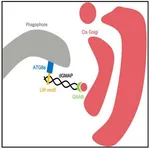 A team of researchers led by Professor Ioannis Nezis has identified the molecular and cellular mechanisms that regulate selective autophagy in the fruit fly Drosophila melanogaster.
A team of researchers led by Professor Ioannis Nezis has identified the molecular and cellular mechanisms that regulate selective autophagy in the fruit fly Drosophila melanogaster.
Press Release (31 May 2022)
Vacancies - Assistant or Associate Professor in Life Sciences
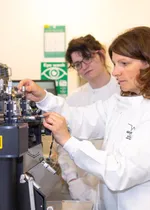 We have three positions available for Assistant or Associate Professor to join the School of Life Sciences (SLS). We are looking for individuals who are capable of developing innovative and original research programmes that address current and future challenges in life science, such as environmental change, sustainable intensification, biology of disease, neuroscience, understanding whole organism dynamics or engineering biology.
We have three positions available for Assistant or Associate Professor to join the School of Life Sciences (SLS). We are looking for individuals who are capable of developing innovative and original research programmes that address current and future challenges in life science, such as environmental change, sustainable intensification, biology of disease, neuroscience, understanding whole organism dynamics or engineering biology.
Closing date: Sunday 16 January 2022.
CTP programme for Sustainable Agricultural Innovation - funded PhD project opportunity
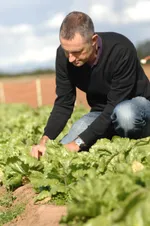 The UKRI and Biotechnology and Biological Sciences Research Council (BBSRC) has awarded a Collaborative Training Partnership (CTP) grant to a consortium led by G’s Growers Ltd. The CTP programme for Sustainable Agricultural Innovation (CTP-SAI) is a groundbreaking partnership between leading businesses, charities and research providers to offer outstanding training for the agri-food sector.
The UKRI and Biotechnology and Biological Sciences Research Council (BBSRC) has awarded a Collaborative Training Partnership (CTP) grant to a consortium led by G’s Growers Ltd. The CTP programme for Sustainable Agricultural Innovation (CTP-SAI) is a groundbreaking partnership between leading businesses, charities and research providers to offer outstanding training for the agri-food sector.
Through this programme, the University of Warwick is offering a PhD enabling the successful candidate to gain a wide range of experience in conventional and molecular plant pathology and also of microbial community analyses through next generation sequencing approaches. This PhD is a unique opportunity to blend research techniques from lab to field and work with one of Europe’s biggest lettuce producers. The project on 'Integrated control of Fusarium wilt of lettuce in relation to pathogen and microbial community dynamics' will be supervised by Professor John Clarkson (SLS) and Dr Helen Bates (NIAB).
The deadline for applications is 8 April 2022.
Arctic Drift: A Year in the Ice - watch the documentary on 16 October
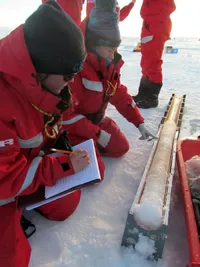 On Saturday 16 October 2021 at 6:30pm, Channel 4 will be showcasing the documentary 'Arctic Drift: A Year in the Ice', covering the goal of MOSAIC and the science undertaken during the Expedition.
On Saturday 16 October 2021 at 6:30pm, Channel 4 will be showcasing the documentary 'Arctic Drift: A Year in the Ice', covering the goal of MOSAIC and the science undertaken during the Expedition.
In September 2019, the icebreaker RV Polarstern left her home port in Bremerhaven to sail north. Her goal was to act as the Multidisciplinary drifting Observatory for the Study of Arctic Climate (MOSAiC), the largest Arctic Research Expedition ever undertaken, with the collaboration of over 80 institutions from 20 countries, to study both winter and summer processes and relationships between ocean, ice and atmosphere.
University of Warwick SLS scientists Dr Alison Webb, Professor Hendrik Schaefer and Professor Yin Chen, undertook the 'Sea Ice Microbiology and the Role in Cycling of Sulfur' (SIMbRICS) Project during the second half of MOSAiC. Overall, this project, in collaboration with the University of Groningen (NL) and the University of East Anglia (UK), aimed to study the in-situ production of the climate-relevant biogenic gas dimethylsulfide (DMS) and to link this with the diversity of the microbial community.
As the sea ice transitioned from the long Arctic winter, through a short spring to summer of 24 hours of daylight, ice melt created a highly variable environment of meltponds and a stratified surface ocean, which changed again through the onset of autumn. These changes create a high stress environment for the microbiome and the SIMbRICS project is investigating how these changing conditions affect the production of climate-relevant trace gases such as DMS.
Starving Tuberculosis (TB) of sugars may be a new way to fight it
Tuberculosis is a devastating disease that claims over 1.5 million lives each year. The increase in TB cases that are resistant to the current antibiotics means that novel drugs to kill Mycobacterium tuberculosis (Mtb) are urgently needed. Dr Elizabeth Fullam and colleagues have successfully discovered how Mycobacterium tuberculosis uses an essential sugar called trehalose, which provides a platform to design new and improved TB drugs and diagnostic agents.
Press Release (15 April 2021)
Associate Professor/ Professor of Infection Microbiology position available
Applications are invited for an Associate Professor or Professor of Infection Microbiology to join the School of Life Sciences at the University of Warwick.
The School of Life Sciences has an international presence in microbiology, particularly within the global research priority of antimicrobial resistance (AMR). We aim to appoint an outstanding new academic staff member to strengthen research in cross-disciplinary approaches, complementing existing strengths in the School and leading a laboratory based research group in one or more of the following areas: antimicrobial resistance, anti-infective discovery, host-pathogen interactions and immunology including the microbiome, microbial genetics, virology and structural and chemical biology approaches to address human and animal infection.
Closing date: 30 April 2021
Construction completed on “world-class” biomedical research building
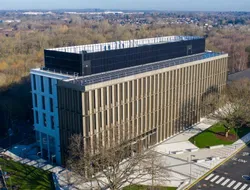 Our impressive new IBRB biomedical research building has been completed. The new state-of-the-art lab spaces will support our interdisciplinary world-class research in neuroscience, microbiology and infection, and cell biology.
Our impressive new IBRB biomedical research building has been completed. The new state-of-the-art lab spaces will support our interdisciplinary world-class research in neuroscience, microbiology and infection, and cell biology.
Press Release (24 March 2021)
Science on the Hill event 30 March - New Scientists: New Research
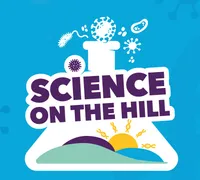 Science on the Hill is a programme of events jointly organised by the School of Life Sciences and Warwick Medical School - both based on the Gibbet Hill campus.
Science on the Hill is a programme of events jointly organised by the School of Life Sciences and Warwick Medical School - both based on the Gibbet Hill campus.
Our next event is on Tuesday 30 March, 7-8pm - New Scientists: New Research.
Hosted by Prof Kevin Moffat the speakers are Dr Erin Greaves from Warwick Medical School and Dr Ellie Jameson and Emily Hill from the School of Life Sciences.
Hunting for life-saving phage in sewage
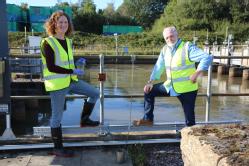 Dr Eleanor Townsend and Dr Ellie Jameson were part of a documentary on the ‘Secret Science of Sewage', aired on Thursday 18 March. The researchers were filmed collecting samples from Minworth Sewage works and characterising the phages they contain, as a possible solution in the fight against antimicrobial resistant bacteria. Dr Eleanor Townsend was filmed in the School of Life Sciences imaging suite, imaging the phages on the Transmission Electron Microscope. Dr Ellie Jameson discussed the results with Dr George McGavin.
Dr Eleanor Townsend and Dr Ellie Jameson were part of a documentary on the ‘Secret Science of Sewage', aired on Thursday 18 March. The researchers were filmed collecting samples from Minworth Sewage works and characterising the phages they contain, as a possible solution in the fight against antimicrobial resistant bacteria. Dr Eleanor Townsend was filmed in the School of Life Sciences imaging suite, imaging the phages on the Transmission Electron Microscope. Dr Ellie Jameson discussed the results with Dr George McGavin.
The Jameson laboratory, at the University of Warwick, is developing phage cocktails to prevent the most common UTI infections (Enterobacteriaceae) that can lead to severe complications. Findings have recently been published on the use of phages to prevent catheter biofilms: Townsend, E. M., Moat, J., & Jameson, E. (2020). CAUTI’s Next Top Model–model dependent Klebsiella biofilm inhibition by bacteriophages and antimicrobials. Biofilm, 2, 100038. This involves hunting for novel, diverse phages in sewage and characterising them.
The Jameson laboratory has also supplied their rigorously characterised phages for compassionate use in patients with no other treatment options. This work was recently peer reviewed and accepted in the journal; Phage - Townsend, E., Kelly, L., Gannon, L., Muscatt, G., Dunstan, R., Michniewski, S., ... & Jameson, E. (2020). Isolation and characterisation of Klebsiella phages for phage therapy. bioRxiv.
Work is currently being expanded to design phage cocktails to treat pneumonia, bloodstream infections and inflammatory bowel disease in collaboration with Professor Trevor Lithgow at Monash University.
Identified: A mechanism that protects plant fertility from stress
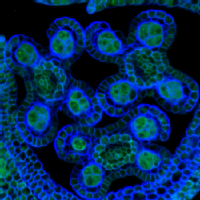 As temperatures rise due to global warming the need to protect plants from stressful conditions has increased, as stress can cause a loss in yield and cause further impact economically. A consortium led by Professor Jose Gutierrez-Marcos have successfully identified two proteins that protect crops from stress, which is key in safeguarding food production.
As temperatures rise due to global warming the need to protect plants from stressful conditions has increased, as stress can cause a loss in yield and cause further impact economically. A consortium led by Professor Jose Gutierrez-Marcos have successfully identified two proteins that protect crops from stress, which is key in safeguarding food production.
Press Release (1 March 2021)
